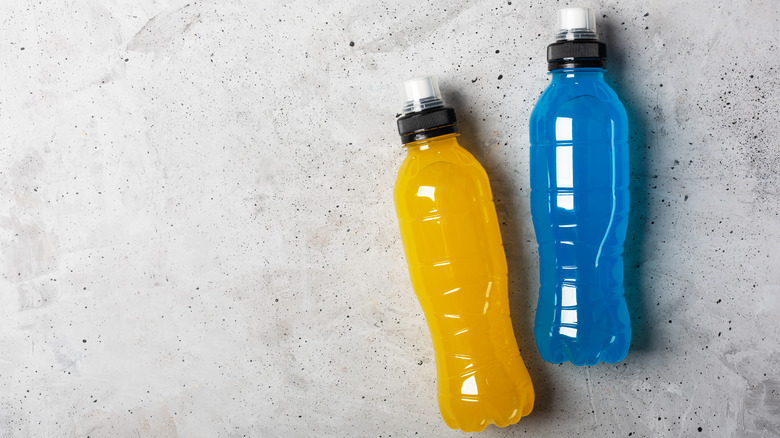Recent Study Reveals The Difficulty In Getting People Away From Sports Drinks
The health risks associated with drinking sugary beverages like soda have been well documented. According to ThoughtCo., soda's negative health impacts were recognized as early as 1942, and campaigns against the variety of sugary beverages began in the 1990s. The CDC reports that drinking beverages with high sugar contents similar to sodas can lead to obesity, type 2 diabetes, kidney disease, and heart disease.
While sodas aren't the only culprit of having high sugar content, they are one of the worst offenders. For example, Mountain Dew is one of the most sugar-loaded sodas on the market and contains 77 grams of sugar in every 20-ounce bottle. Many health officials similarly disfavor diet sodas — the WHO has also released guidelines warning against using non-sugar sweeteners to replace these sugar-heavy drinks. Even diet sodas or products often marketed as "healthy alternatives" can harm your health.
Though sodas are a big part of the problem, people are catching on; The New York Times reports that American soda consumption has slowly reduced in recent years. However, another sugary beverage with a better reputation might be harder to quit.
Sports drink sales are resilient
Beverages labeled as sports drinks are often considered healthier than soda because of the presence of electrolytes and other nutrients, per the Harvard T.H.Chan School of Public Health. Despite the nutritious additives, health officials consider them unnecessary for most individuals. The University of Maryland Medical System notes that a balanced diet and plenty of water are sufficient for most individuals to avoid dehydration unless they actively participate in multi-hour athletic activities. Sports beverages can also contribute to many of the same sugar-related health effects as sodas because of their carbohydrate content.
A recent study published in AJPM Focus has found that sports drinks might be the hardest sugary beverage to quit because of these perceptions of being "a lower sugar alternative with electrolytes." Researchers found that after a six-year-long campaign to reduce the consumption of sugary drinks in Howard County, MD, soda and fruit juice sales dropped by 29% and 33%, respectively. In contrast, sports drink sales lowered at the same rate as a nearby control community. These results led them to conclude that the campaign did not affect sports drink consumption in the same manner as other sugary drinks.
The researchers concluded that "it will be important to continue efforts to decrease sports drink consumption because they are associated with the same negative consequences as those of other [sugar-sweetened beverages]."

